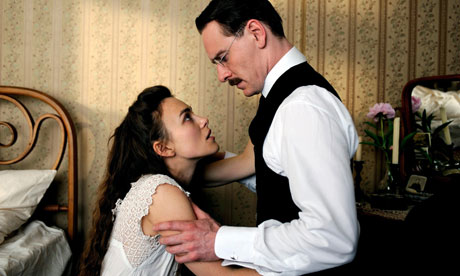
"These modern analysts! They charge so much!" declares a character in Woody Allen's collection Getting Even, "In my day, for five marks Freud himself would treat you. For 10 marks, he would treat you and press your pants." Sigmund Freud's tricky financial situation has a recurring cameo in David Cronenberg's seriocomic new movie, an adaptation of Christopher Hampton's play The Talking Cure, about Freud, Jung and their mutual patient-acquaintance, and later colleague, Sabina Spielrein. It's an entertaining reminder that the sex-instinct once had an intimate psychological link with poverty. It meant children to feed and clothe.
This is a cool, measured, loquacious film; even its sexual adventures are shown with a clinical detachment, and there is a droll undercurrent of black comedy. Cronenberg is usually associated with body horror, but the nearest this film comes to anything of the kind is Keira Knightley's facial contortions playing Sabina Spielrein at the height of her mental turmoil; she is the young Russian neurotic carried kicking and screaming to the Swiss treatment room of CG Jung, played by Michael Fassbender with a clerkly and supercilious manner. As she screeches and yelps, Sabina's lower jaw is shoved out what looks like a couple of feet with a lower row of teeth jutting jaggedly upwards, like Ridley Scott's Alien when it comes out of John Hurt's stomach.
The lives of Spielrein and Jung are to intersect with that of the great master Freud, played by Viggo Mortensen. Ambitious Jung is excited at the prospect of applying Freud's proposed new "talking cure" to Sabina, and that he will be the first analyst ever to do so, as Freud, like Darwin, has been unwilling to go fully public with his ideas. But Cronenberg shows there are quasi-Oedipal tensions between the two men: one is a prosperous and complacent gentile whose wife has money, the other is a Jew, maintaining a large family in a small apartment; his life is more difficult and finds the younger man puppyish and naïve. Freud insists on sex as the primary foundation; Jung has other ideas, including cranky and eccentric interests in psychic phenomena and telepathy. But it doesn't take him long to diagnose sexual suppression in Sabina's case, stemming from childhood beatings that have caused masochistic desires in adulthood. Jung finds himself unable to resist an affair with Sabina, and they work through their mutual issues with spanking sessions. This was before anyone had ever heard of "boundary issues" or "inappropriate contact".
"Transference" is how Freudians describe the redirection of feelings towards your therapist, and there are weird triangular patterns of transference between Sabina, Freud and Jung, whose emotional ménage à trois is more potent than the one Jung is having with Sabina and his complaisant wife. Fassbender's Jung is pernickety and precise, a bourgeois academic, his eyes gleaming not so much at the thought of sex with Sabina but the prospect of making a name of himself and supplanting the master. Viggo Mortensen's Freud is bland, tolerant, opaque.
Cronenberg has created a drama of male hysterics with no interest in diagnosing their own condition – perhaps the career of each is a continuous, elaborate symptom. Why on earth does Jung make Sabina his assistant as he subjects his wife to a word-association test, if not to impose himself on her sexually? The director allows us to ponder Freud's own motives for referring a certain patient to Jung: the anarchic Otto Gross (Vincent Cassel), a man whose unrepentant sensualism tempts Jung to seduce Sabina. Who is doing the seducing here? Could it be that Freud has found a way of forcing Jung to admit the primacy of sex? Or even that he is trying to engineer a scandal in Jung's marriage, and destroy an impudent young pretender to his crown?
With some restraint, Cronenberg and Hampton do not play upon the much-discussed German puns in the three principals' names: that is, Freud equals joy, Jung equals young, and Spielrein equals either "play pure" (Spiel-rein) or "play inside", even "play inside me" (Spiel-herein). This could be because Freud's joyfulness appears in short supply. He is a man in the evening of his life, and has to reconcile this with the fact that his ideas, still in their infancy, are set to be inherited by a junior colleague of whom he can never approve.
Knightley's Sabina is highly strung, intensely persuasive and alluring, as she entrances Jung with excitable theories of creativity based on Wagner, a belief that only through a great evil or destructive reversal can something new and dynamic be born. She has been galvanised, if not precisely cured, by being taken on as Jung's lover, and then effectively as his pupil. It could even be that her own ideas, and her prospective career in analysis, will be born from the incineration of Jung's relationship with Freud.
"You're looking at the future!" says Jung to Freud, as they gaze upon the faintly surreal, digital skyline of New York from the deck of a steamship that has brought them over (briefly) from the old country. But that's what they themselves are, these fastidious, competitive intellectuals whose ideas were the shape of things to come; they have made of themselves a spectacle of the future that from our present perspective looks subtly, touchingly absurd.

